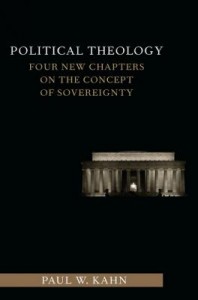When modern revolutionaries took up the task of translating the felt meaning of political revolution into a constitutional order of…
Political Theology

In Political Theology: Four New Chapters on the Concept of Sovereignty (Columbia University Press, 2011), Paul W. Kahn contends that American political experience is incomprehensible outside the terms of political theology—not because the United States is, or ever was, a “Christian nation,” but because the state “creates and maintains its own sacred space and history.” Engaging Carl Schmitt’s 1922 Political Theology: Four Chapters on the Concept of Sovereignty as a basis from which to explore how America’s faith in the popular sovereign generates an ethos of sacrifice and a logic of exception that structure the nation’s political life and jurisprudence in ways that have become particularly visible in the post-9/11 world, Kahn’s argument raises questions of pressing concern:
What is political theology and how does it function in a liberal constitutional order, in America or elsewhere?
Can political theology form the basis for a “secular” mode of inquiry into politics and society?
What resources does it offer for understanding freedom and its relation to law and justice?
Pluralizing political theology
My claim and concern is not only that Kahn is captured by Schmitt’s particular view of political theology as a…
Mirror, mirror on the wall
After the manner of psychoanalysis, political theology reflects the larger, darker, contours that liberalism—the discourse of the modern nation-state—fails to…
The perspective of the common
In liberal theory, essence is privileged over existence, reason over will, and endless discussion over decision. In political theology, things…
The geopolitical imperative?
Ritualistic evocations of "America" . . . and the deep-seated sense that somehow the United States is sacrosanct space—war, by…
Paul Kahn’s roots
Paul W. Kahn's Political Theology: Four New Chapters on the Concept of Sovereignty is a compelling book, though compelling in…
The politics of the atonement
To grasp the deep architecture of the political today, therefore, is to venture into the theological domains of Christology and…
The political theology of freedom and unfreedom
Kahn has identified an ideal---the sacrificial ideal of freedom---that exists both as an ideal and at times in practice. And…
The integrity of theory
I am delighted that my new book on political theology has provided the occasion for this conversation. The editors have…
Political theology or political hierophany
In this book, Paul Kahn argues that political theology---as first defined by Schmitt---is not only a “polemical” discourse but also…











